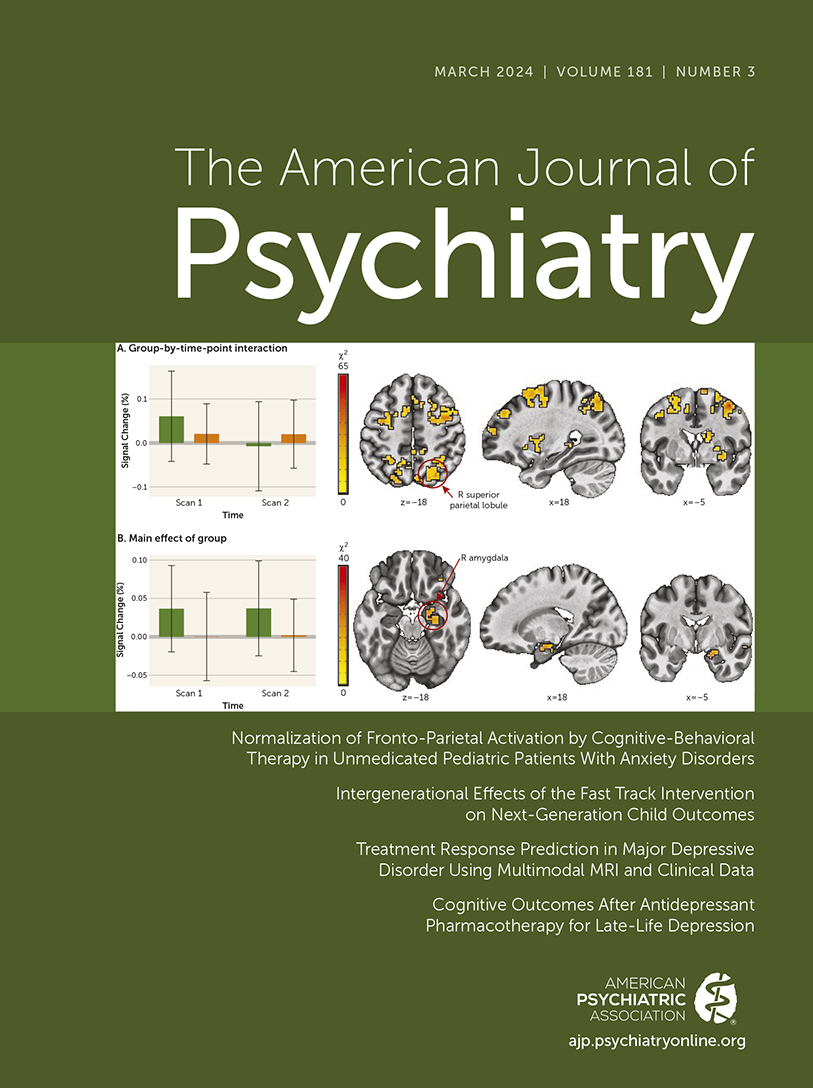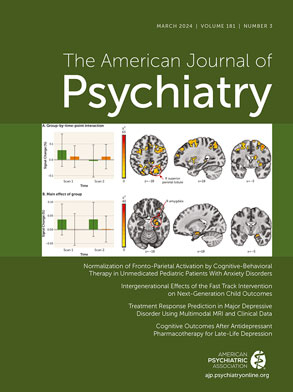Consider the monumental questions in mental health that have been posed by scholars but have lingered unanswered. Can we use research to examine such grand topics? Certainly yes, but not in the unethical ways illustrated in the documentary
Three Identical Strangers (
1), in which triplets were, without caregiver knowledge or consent, adopted out to families that varied in socioeconomic status. As research methodologists recognize, there are ethical methods to answer such crucial long-range mental health questions. One preferred approach adopts a longitudinal design that examines, often after a quality intervention, the degree to which there are changes “down the river.” If the intervention was a treatment, the research question is “Were the treatment effects maintained?” If the intervention was prevention, the question is “Was there a downriver reduction in the rate of the target problem?” Longitudinal follow-ups of 6 or 12 months are helpful. Follow-ups of 2, 3, or 5 years are better. One can argue that if an intervention is truly impactful, it may have effects so profound that subsequent generations are influenced.
In this issue, Rothenberg and colleagues provide interesting data evaluating the intergenerational effects of the Fast Track intervention on next-generation youth outcomes (
2). This intervention blended a variety of parent- and child-directed treatment approaches for 1,057 children from grades 1 through 10 in an attempt to mitigate emerging mental health problems. Fast Track was associated with reductions, relative to a control group, in the use of general inpatient services by children in the next generation; however, it did not significantly improve mental health symptoms of next-generation children. Service use (i.e., inpatient and outpatient mental health services and general health services) was examined as an outcome variable after the Fast Track intervention. Service use can be key because it reflects lowered costs and, potentially, less need for youth mental health services. However, data on service use can be complicated by numerous other factors (e.g., geographic access barriers, costs, and cohort effects) and could be seen as less critical than examining the actual mental health status of next-generation youths (e.g., meeting diagnostic criteria and level of symptoms). This limitation can be minimized, however, by emphasizing the finding that Fast Track participants used less corporal punishment. When less corporal punishment is made a priority, the reported findings are both impressive and meaningful for society. Corporal punishment is known to have unwanted effects, and despite temporary compliance, it simply does not work. Consider the findings of a meta-analysis of studies evaluating the effects of spanking. Gershoff (
3) found that spanking has numerous negative results on other behaviors. For instance, 1-year-old children who are spanked are more likely to be aggressive and perform worse on cognitive tests years later than children who are not spanked. Almost all the studies in the meta-analysis identified the negative effects of spanking—spanking makes youths more aggressive, more likely to be delinquent, and more likely to have mental health problems. Patterns of behavior can be learned through direct experience and the observation of others (
4,
5). One need only recognize that children often mimic parental behavior.
One-dimensional interventions are less likely to have robust effects, whereas multifaceted approaches that capitalize on multiple knowledge bases and the integration of synergistic strategies can have maximal effects. Accordingly, Fast Track, a blend of parent behavior-management training, social-cognitive skills training, and changes in classroom social ecology, has had some meaningful effects. There are some who might argue for a dismantling study, designed such that youths are randomized to receive separate intervention conditions, whereby each condition addresses one of the purported active ingredients. Such a study would be highly costly and likely to yield results that are less potent than the effects of the full program. Rather than dismantling, the needs of the community as well as the mental health of youths dictate that we invest in training professionals to disseminate and implement interventions that work.
Dissemination and implementation is not a new field. For instance, there is evidence suggesting that successful dissemination benefits from a local champion (
6). Successful dissemination—in terms of intervention outcomes—also requires adherence to the program, in which the implementation is thoughtfully applied with integrity and not watered down or simplified. Indeed, the degree to which an empirically supported intervention can be applied with both flexibility and integrity is a topic of ongoing concern (
7).
It is wise to balance the beneficial effects of an intervention with the burden associated with its implementation. Considering that Fast Track was an intensive and multipronged school-based intervention, we must question and examine the potential burden on schools. If the intervention is intended to be implemented by teachers, we would be transferring the work burden from mental health professionals (those trained to implement the program) to teachers who are already overworked and underpaid. When classroom teachers are placed at the end of a top-down hierarchy, there are inevitable unwanted consequences. Imagine the developer of a treatment who idealizes the program and dismisses the difficulties of its real-world implementation, or imagine the number of potentially beneficial programs for youths that can be poured into the schools, with the ultimate burden on the classroom teachers. Dissemination and implementation in schools merit the hiring of additional trained staff to implement empirically supported interventions. Especially considering the variability of funding across schools, the addition of resources and support is crucial to ensure the success of the program. There is limited benefit in making yet another demand on existing school faculty.
When large studies are undertaken and result in compelling findings, what else comes down the river? I (P.C.K.) have on numerous occasions been disappointed by the nonbenign neglect of key findings. If policy makers were to become informed of the data and use facts to direct their policy decisions, they could move more quickly to implement successful programs. The value of social-cognitive skills has long been recognized by mental health researchers and practitioners alike (
8–
10), but training in these skills in American schools remains scarce.
The authors note the limitation that parent reports can be biased, but unblinded parent reports can be especially prone to bias. Although future research could improve the study design, it is unclear whether another study as large as Fast Track will be done. Considering this, shouldn’t we first implement what seems to have resulted in beneficial gains?
In an April 2018 personal communication with Ronald Kessler, we discussed the differential characteristics of the treatment of youth mental health disorders and the prevention of youth mental health disorders. Among the positives of prevention, he mentioned something akin to “instead of treating the people drowning in the river, we need to go upstream and stop the person throwing the people in the river.” This statement directs us to the importance of early intervention, rather than waiting for the resulting detrimental impact on mental health. Indeed, the primary prevention of secondary disorders merits attention and application (
11). For example, successfully reducing anxiety disorders in youths (
12) can have beneficial effects on functional adjustment and expected substance use approximately 6.5 years later (
13,
14). The more we know about the value of early intervention, such as reducing corporal punishment, the greater the downstream effects.

